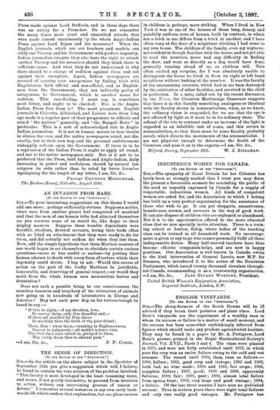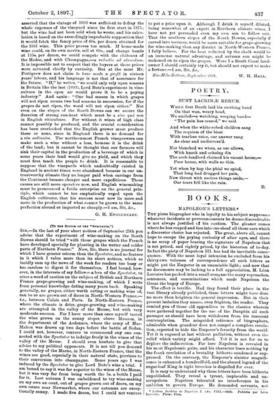ENGLISH VINEYARDS.
[To TER EDITOR Or THE " SPECTATOR: ] Sin,—The sheep-farmers of the South Downs will be Mt advised if they break their pastures and plant vines. Lord, Bate's vineyards are the experiment of a wealthy man to whom its success or failure is a matter of small moment, and the success has been somewhat unthinkingly inferred from• figures which should make any prudent agriculturist hesitate. They may be found in a paper by Mr. A. Pettigrew, Lord Bute's grower, printed in the Royal Horticultural Society's Journal, Vol. XVII., Parts 3 and 4. The vines were planted in 1875, and were not fully established until 1879, in which year the crop was an entire failure owing to the cold and wet summer. The record until 1894, then, runs as follows:- 1880, failure ; 1881, good crop and vintage; 1882 and 1883,. both bad, no wine made ; 1884 and 1885, fair crops ; 1886,, complete failure ; 1887, good ; 1888 and 1889, apparently failures; 1890, fair; 1891, poor ; 1892, almost total failure from spring frost; 1893, very large and good vintage ; 1894, a failure. Of the last three seasons I have seen no published account. Thus in sixteen years there were eight total failures and only two really good vintages. Mr. Pettigrew has asserted that the vintage of 1893 was sufficient to defray the whole expenses of the vineyard since its first start in 1875; but the wine had not been sold when he wrote, and his calcu- lation is based on the exceedingly improbable supposition that it would fetch the fancy price of 60s. per dozen obtained for the 1881 wine. This price proves too much. If home-made wine could, on its own merits, sell at 60s., and change hands at 115s. per dozen, we could compete with the chateaux of the Medoc, and with Champagne,—a reductio ad absurdum. It is impossible not to suspect that the buyers at these prices were actuated chiefly by curiosity. But at the most Mr. Pettigrew does not claim to have made a profit in sixteen years' labour, and his language is not that of assurance for the future. "If," he writes, "we could only rely upon seasons in Britain like the last (1893), Lord Bute's experiment in vine- culture in the open air would prove it to be a paying industry." And again : " One bad season in which grapes will not ripen means two bad seasons in succession, for if the grapes do not ripen, the wood will not ripen either." Not even on the slopes of the South Downs can we secure the duration of strong sun-heat which must be a sine qud non in English viticulture. For without it wines of high class cannot possibly be produced, and the crucial consideration has been overlooked that the English grower must produce these or none, since in England there is no demand for a yin ordinaire. The northernmost French vinegrowers can make such a wine without a loss, because it is the drink of the land ; but it cannot be thought that our farmers will sink their capital in the production of a beverage of which in some years their land would give no yield, and which they must first teach the people to drink. It is reasonable to suppose that the vineyards which undoubtedly existed in England in ancient times were abandoned because in our un- trustworthy climate they no longer paid when carriage from the Continent became cheaper and more expeditious. These causes are still more operative now, and English winemaking must be pronounced a futile enterprise on the general prin- ciple, which cannot be too emphatically urged upon the English cultivator, that his success must now lie more and more in the production of what cannot be grown to the same perfection abroad or imported so cheaply.—I am, Sir, &c.,
G. H. ENGLEHEART.
MO Tits EDITOR. Of TIM "SPICTATOR:1 SIR,—In the last of your short notices of September 25th you advise that the experiment of wine-making on the South Downs should be tried "with those grapes which the French have developed specially for planting in the wetter and colder parts of Northern France." Now, Sir, there is no journal for which I have greater esteem than the Spectator, and no feature in it which I value more than its short notices, which so lucidly sum up the news of the week for readers too busy or too careless to digest it for themselves. I feel bound, how- ever, in the interests of my fellow-ri a iers of the Spectator, to utter a word of caution on the subject of British and Northern France grape-growing and wine-making, of which I write from personal knowledge dating many years back. Speaking generally, no grapes, either worth eating or making wine of, can be or are grown out of doors in North-Western France,- i.e., between Calais and Paris. In North-Eastern France, where the climate is drier, grape-growing and wine-making are attempted in the valley of the Meuse, but with very moderate success. For I have more than once myself tasted the wine grown on the sunny slopes above Mouzon, in the department of the Ardennes, where the army of Mac- Mahon was drawn up two days before the battle of Sedan. I could not, however, venture to recommend any one con- nected with the Spectator to indulge freely in the wines of the valley of the Meuse. I should even hesitate to give that advice to my political opponents. It is not till you descend to the valley of the Marne, in North-Eastern France, that the wines are good, especially in their natural state, previous to their conversion into champagne. Some years ago I was induced by the Spectator to give Lord Bute's wine a trial. I am bound to say it was far superior to the wines of the Meuse, but it was very far from being worth the 5s. a bottle I paid for it. Last autumn I was emboldened to try wine-making on my own sts ;mint, out of grapes grown out of doors, on my own estate near Newmarket, where our autumns are excep- tionally sunny. I made five dozen, but I could not venture
to pat a price upon it. Although I drink it myself, diluted, being somewhat of an expert in Northern climate wines, I have not yet persuaded even my own son to follow suit. That the southern slopes of the South Downs, especially if carved into terraces, would be more suitable for grape-growing for wine-making than any district in North-Western France, I fully believe. For the heat reflected by the chalk would be an immense natural advantage, and autumn sun might be reckoned on to ripen the grapes, Were I a South Coast land- owner I should certainly try it, but should not expect to make a fortune.—I am, Sir, &o.,
Six-Mile-Bottom, September 2Sth. W. H. HALL.







































 Previous page
Previous page